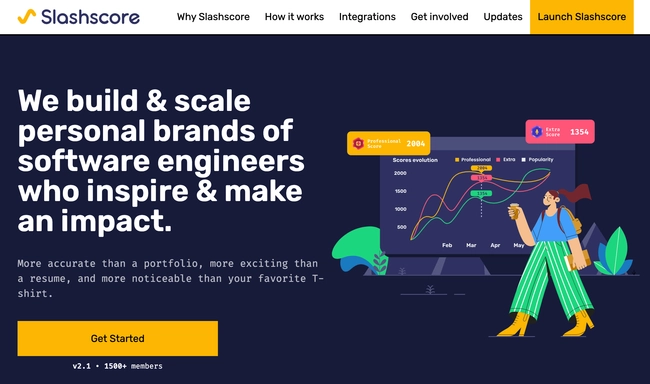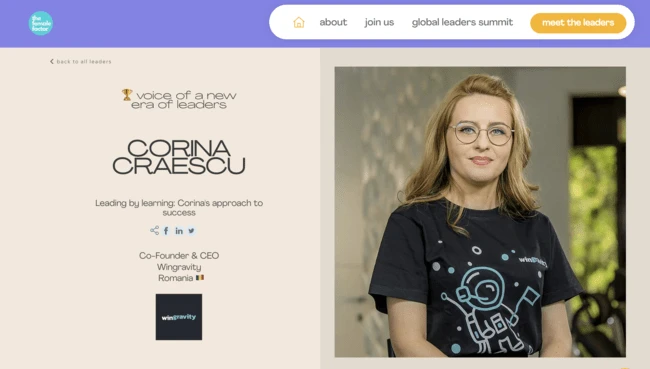You may think that your work as a software engineer speaks for itself. But in today’s job market, it’s important to have a strong personal brand if you want to do great in your career.
Personal branding is the process of making a unique image and name for yourself. In the tech industry, it can be the difference between getting noticed and being ignored.
In this article, we’ll talk about why personal branding is important for software engineers and show you how to build a powerful personal brand.
The Importance of Personal Branding in the Tech Industry
“Your personal brand is what sets you apart from others in the industry. It communicates who you are, what you stand for, and what makes you unique. Building a strong personal brand can open doors to new opportunities, and establish you as an authority in your field.” - Rand Fishkin, Founder of Moz and SparkToro.
Personal branding is crucial in the technology industry due to the nature of the work. You likely work on complex initiatives as a software engineer that requires collaboration and communication with others. Personal branding can help you stand out in a crowded field, gain the trust of colleagues and potential employers, and advance your career.
You become a more desirable candidate for promotions, leadership positions, and new jobs if you have a distinct brand and reputation. Additionally, it can help you establish a network of like-minded professionals who can offer support and guidance throughout your career.
Steps to Building a Personal Brand as a Software Engineer
1. Identifying Your Unique Skills and Strengths
Identifying your distinct skills and capabilities as a software engineer is the initial step in establishing your personal brand. Begin by making a list of your technical talents, experience, and achievements. Consider what distinguishes you from other software engineers and what you offer that others do not. This could include a specific programming language, experience with a particular technology, or a history of delivering projects on time and within budget.
2. Creating a Personal Brand Statement
The next stage is to construct a personal brand statement after you have identified your unique skills and strengths. This is a concise summary of who you are, what you do, and why you do what you do. It should be no longer than a few sentences and convey your value proposition as a software developer in a concise manner. For instance, “I am an experienced software developer with a passion for developing innovative solutions to complex problems.”
3. Building Your Online Presence
Personal branding requires a robust online presence in the current digital age. Create a professional website or online portfolio to highlight your skills, experience, and achievements or a Slashscore account, or both.
Consider also establishing a presence on social media platforms such as LinkedIn, Twitter, and GitHub. These platforms can facilitate connections with other professionals in your field and the dissemination of your knowledge.
4. Networking and Building Relationships in the Tech Industry
Personal branding requires an emphasis on networking. Attend industry events and conferences to network with other software engineers and establish connections with prospective employers and clients. Join online communities such as Slack channels, and LinkedIn groups to interact with other professionals and keep abreast of the most recent trends and developments in your field.
5. Creating Valuable Content and Sharing Your Expertise
As a software engineer, one of the most effective methods to develop a personal brand is to create valuable content and share your expertise. This may involve open source contributions, creating blog posts, instructional videos, or webinars. By sharing your expertise and insights, you increase your credibility among potential employers or clients.
6. Leveraging Social Media for Personal Branding
Social media can be an effective tool for establishing a personal brand, but it must be utilized strategically. Utilize social media platforms to share your content, interact with other professionals in your field, and cultivate relationships with prospective employers or clients. However, be mindful of the content you share and ensure that your social media profiles reflect your personal brand.
7. Measuring the Success of Your Personal Brand
Lastly, it is essential to evaluate your personal brand’s success. Monitor metrics such as website traffic, social media engagement, and the number of inquiries or job proposals received. Adjust your personal branding strategy as necessary based on this information.
Examples of Successful Personal Brands in the Tech Industry
In the tech industry, there are numerous examples of successful personal brands. Listed below are some of them:
John Sonmez - Founder of Simple Programmer and author of “Soft Skills: The Software Developer’s Life Manual”: https://simpleprogrammer.com/
Quincy Larson - Founder of freeCodeCamp: https://www.freecodecamp.org/
Scott Hanselman - Software Architect, Author, and Speaker: https://www.hanselman.com/
Sarah Drasner - Vue.js core team member and author of “SVG Animations”: https://sarahdrasnerdesign.com/
Dan Abramov - Co-author of Redux and Create React App, and developer at Facebook: https://overreacted.io/
Kent C. Dodds - Software engineer and instructor specializing in React and testing: https://kentcdodds.com/
Wes Bos - Full-stack web developer, author, and educator: https://wesbos.com/
Addy Osmani - Engineering Manager at Google, author of “Learning JavaScript Design Patterns”: https://addyosmani.com/
Kent Beck - Creator of Test-Driven Development (TDD) and Extreme Programming (XP): http://www.threeriversinstitute.org/KentBeck.html
Martin Fowler - Author and software consultant, known for his work in software architecture and agile methodologies: https://martinfowler.com/.
These have built strong personal brands by sharing their expertise, building communities, and creating valuable content. By studying their examples, you can learn how to establish your own personal brand and grow your career.
Slashscore enables software engineers to showcase their skills and projects and build a powerful brand
With Slashscore you to showcase your skills and achievements, projects and build a strong online presence. Here are some tips and strategies to help you create a powerful personal brand using Slashscore:
Why build your personal brand?
So that you don’t miss out on the opportunities that personal branding in the tech industry can give you.
How to use Slashscore for your personal brand
Slashscore is a tool that can help you create your personal brand specifically designed for software engineers to showcase their skills, experience, and projects. In addition to creating a detailed profile, Slashscore offers several integrations that can assist you in establishing your personal brand and expanding your audience:
Integrations with code hosting platforms
Such as GitHub, GitLab, and Bitbucket you can effectively showcase projects to a wider audience. This not only helps in building a strong professional network but also enhances your online presence and reputation, ultimately boosting your personal brand and career prospects.
Integrations with Social Media Platforms
Slashscore integrates with social media platforms like Reddit and Twitter, so you can share in the feed your stories with our community. You can also connect with other software engineers to grow your network and learn about the latest trends and projects in tech.
Integrations for showcasing your Community Involvement
Slashscore also integrates with community platforms such as Stack Overflow and Meetup. These integrations allow you to showcase your contributions to the community and demonstrate your expertise in specific areas. By being an active member of these communities, you can also build relationships with other professionals and potential employers.
Integrations for showcasing your Publishing Skills
Slashscore offers integrations for publishing skills such as Medium and Dev.to. By publishing articles and blog posts on these platforms, you can showcase your knowledge and expertise in your field. By integrating your account, your posts will be accessible to a larger audience via the Slashscore feed.
Using the available integrations with code hosting platforms, social media platforms, community involvement tools, and publishing platforms, you can expand your reach and showcase your skills and experience to potential employers.
Conclusion
Personal branding is crucial for software engineers who wish to distinguish themselves in a competitive industry and advance their careers. You can create a powerful personal brand that positions you as an authority in your field by identifying your unique skills and strengths, creating a personal brand statement, establishing your online presence, networking, creating valuable content, leveraging social media, and measuring your success.
Remember that personal branding is an ongoing process, so be willing to adapt your strategy as your career develops.
In conclusion, if you’re a software engineer looking to build a strong personal brand, Slashscore is a powerful tool that can help you achieve your goals.
By using Slashscore’s integrations and features, you can showcase your skills, experience, and projects, and build a network of industry contacts that can help you advance in your career.
Sign up today at https://app.slashscore.com/sign-in and let’s get started! 🚀💻💡🔥




